Whenever someone writes about Covid-19 in Israel, they’ll be deluged with claims that the numbers are all fake. The tests are wrong, so people aren’t really sick. Oh, and the hospitals are lying so people aren’t really admitted or ventilated. And the death recording is wrong so people aren’t really dying.
There’s an irony here. When cases were up but hospitalisations were low, people looked for explanations; the same was true when many coronavirus patients were in hospital but deaths were low.
In retrospect, these explanations were probably wrong, and the real reason was just time lag. About two weeks after case numbers surged, hospital numbers shot up too. About a week later, deaths also started increasing.
But all those ad-hoc explanations about over-sensitive testing and over-protective hospitals still live on as zombie facts, cited by those who want to claim that the pandemic is fake. Even Yifat Shasha-Biton, the chair of the Knesset’s coronavirus committee, has had a role in spreading some of these fake facts as a way of hinting that Israel’s Health officials are lying.
It’s not just “more testing”
Israel’s ability to scale up testing is a genuine success; a lot of countries have failed to manage scaling up testing to far and so fast. Israel is doing more than 55,000 tests a day on a good day. 3.5% of Israel’s whole population was tested just last week.
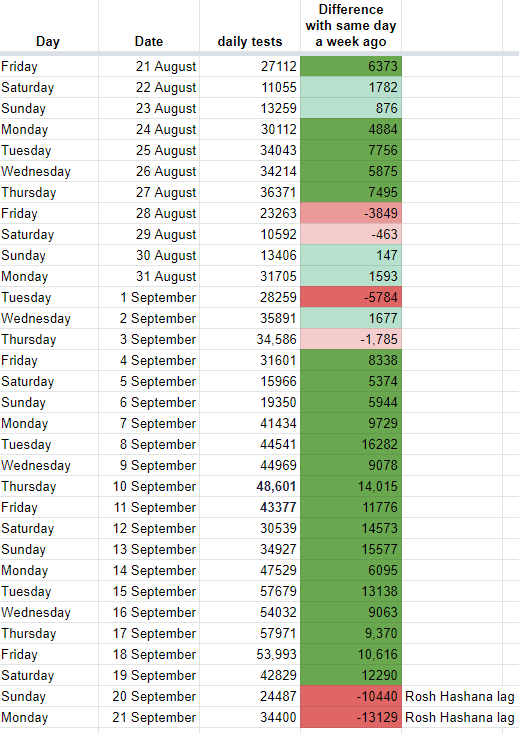
Despite this massive increase in testing, though, about one test in every ten comes back positive. That’s really bad. In August, somewhere between 6-7.5% of tests came back positive. In early September, it was about 8.5%.
Today’s 7-day positivity is 9.74%.
Of course, if Israel only tested 1000 people a day, then it would never have more than 1000 cases! But it’s also not correct to attribute the increase in daily cases solely to testing, either. Case numbers are rising and positivity is rising,
The rise can’t be solely explained by “the test sensitivity” or “false positives” or “too many PCR replication cycles“, either. If false positives were causing Israel’s high caseload, we’d expect to see no increase in the number of people getting actually sick and needing medical attention. In fact, though, hospitalisations are significantly up.
A lot of Covid-19 are in hospital
After a relatively stable August, hospital numbers have significantly increased in September, going from ~800 admitted coronavirus patients and ~380 serious cases to 1350ish patients of which 670 are serious. These numbers are rising fast; some predict serious cases to break 1000 in just a week or two.
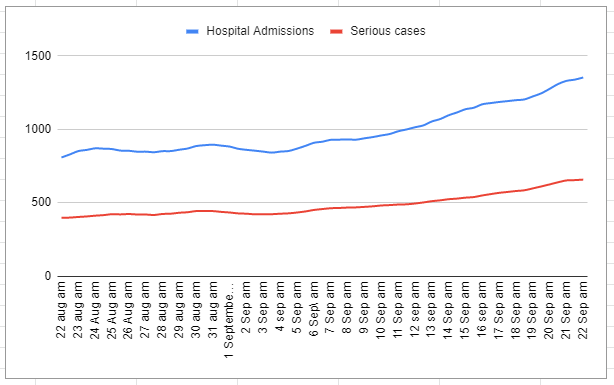
Several hospitals have already stopped accepting new coronavirus patients. Others are scrambling to open more wards and ICUs. The Defence Ministry is exploring building field hospitals and the Health Ministry is looking at ways of increasing medical staff fast, including using medical interns and retirees.
This is probably the most worrying aspect at the moment. Israel never had a lot of spare ICU beds, which is what prompted the initial, early lockdown in the spring. But after things reopened, there was no serious effort to scale up the healthcare system to handle a second wave, just as there was no attempt to build a proper epidemiological tracking system.
The new coronavirus restrictions only came into effect a few days ago, and won’t realistically have any impact on hospital numbers until early October at the earliest. Until then, hospital numbers will probably keep rising based on people who got infected two weeks ago.
Mass indoor synagogue attendance for Rosh Hashana and Yom Kippur, even following all the Health Ministry’s rules, will probably be a further driver of significant infection; so will the widespread disregard of the home hospitality ban.
Unfortunately, I expect these numbers to be much worse by the middle of October.
Daily deaths are increasing
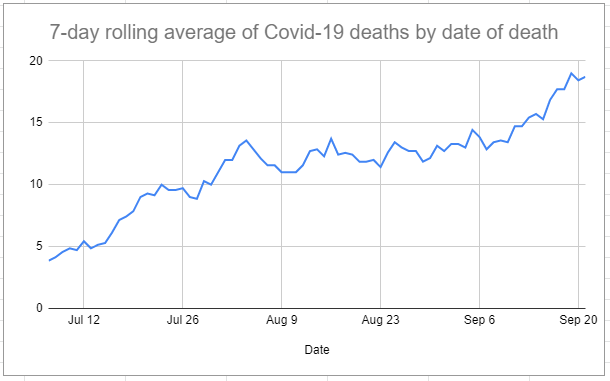
In early July, around five Israelis a day died of Covid-19. This rose quickly to around 12 a day in August, and stayed at this level until early September when it started to rise again to almost 20 a day, or around 2 deaths per million residents per day.
Each death was a real person, a real tragedy, a mourning family.
In comparison with the worst of the coronavirus in the spring, Israel’s death toll seems low, and it is. But compared with other countries right now, it comes off rather worse. Globally, Israel currently has the 18th-highest deaths per capita, and rising.
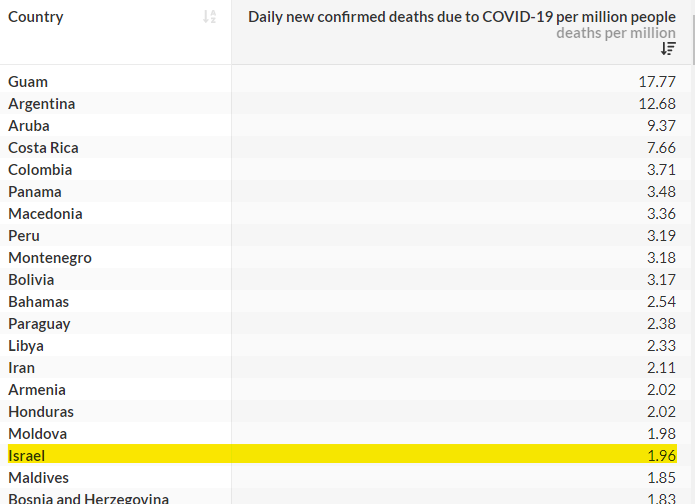
Total Excess Deaths are up
“Excess Deaths” is a measure of how many more people died, in total, than you’d expect based on past trends.
In the first wave in March-May, Israel actually had a small drop in deaths during its lockdown compared to previous years, and in June and July, Covid sceptics claimed that there was no evidence of excess deaths, suggesting that the Health Ministry’s official death toll was perhaps misleading.
Now, though, we can see the real reason for the apparent lack of excess deaths was probably just due to a lag in collecting the data.
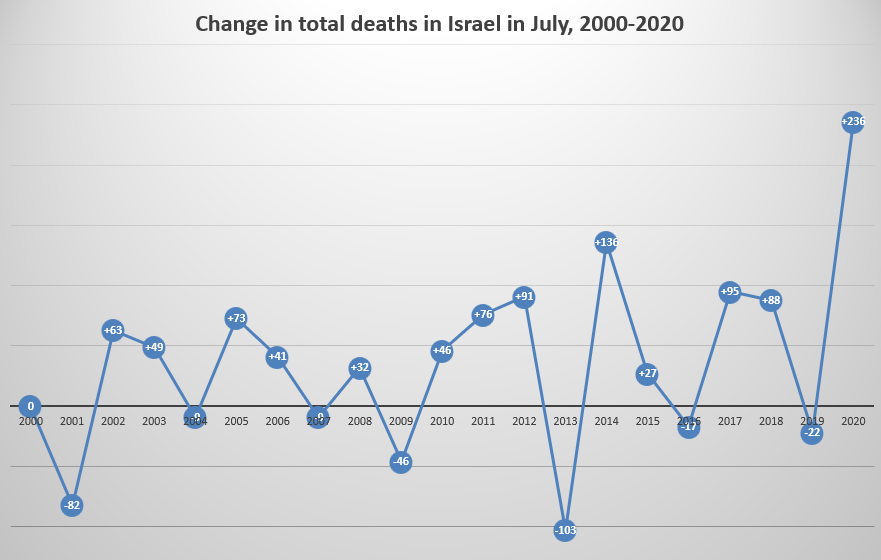
As of now (22 September), the last month we have complete data for is July. In July there was an increase in excess deaths in Israel compared to previous years by about 120 or more. While this is obviously lower than the 234 Covid-19 deaths recorded by the Health Ministry, it does show that something is happening.
Data for the first 20 days of August suggests that August will show over 300 excess deaths; the Health Ministry recorded 384 Covid-19 deaths in August.
Looking at this data, I’d conclude a few things:
- Despite what you might have heard, Israel is seeing excess deaths.
- Unlike in many other countries like the USA or UK, the excess deaths are not significantly higher than the Health Ministry figures, so there probably isn’t a big pool of unreported Covid-19 deaths.
- It’s often claimed that lockdowns and restrictions kill more people than the coronavirus. There is no evidence to support this claim.